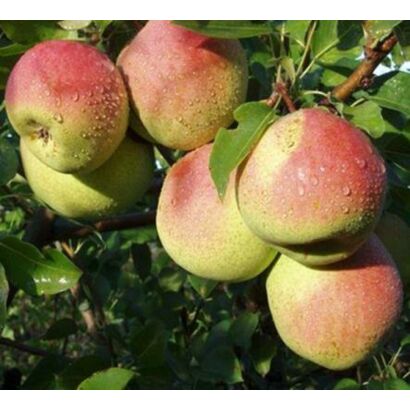Pear Krasulya
Variety: not self-fertile
Fruits: 80-120 gr., pink-yellow
Ripening period: early summer
Yield: 123.2 c/ha
Growing conditions: all regions
Breeding: Ural| Selection | Russia |
| planting material | Pear |
The Krasulya pear was bred by the employees of the Ural Agricultural Research Center (Yekaterinburg). In 2002, the variety was included in the State Register of the Russian Federation for the Volga-Vyatka region. Recommended for cultivation in the Urals, Western and Eastern Siberia.
Variety advantages: early ripening, high yield, winter hardiness, immunity to scab. Disadvantages: the presence of thorns on the shoots.
Characteristics of the variety
Tree medium-sized, 4 m high with a rounded, unthickened crown. The trunk is of medium thickness, gray-green in color, slightly curved. The bark is rough. Fruiting branches are covered with few thorns, which can make harvesting difficult. Young shoots are smooth with a reddish tinge. The foliage is medium in size, elliptical with a smooth plate.
Fruits wide-cone-shaped, weighing 80-120 gr. Peel – oily, yellow-green color with a pink blush. Pulp – creamy, grainy, juicy. Seed box with few seeds. Tasting assessment – 4.7 points out of 5.
Productivity of the variety is high – 123.2 centners per hectare, up to 40 kg of fruits are harvested from a tree. The ripening period of the pear is early summer, the first ripened fruits are removed in early August. Krasulya begins to bear fruit 4-5 years after planting. The tree gives the maximum yield from the 10th year of life. Every 20 years it is necessary to carry out rejuvenating pruning of trees.
Variety Assignment– fresh consumption, preparation of juices, jams, marmalades, etc. Due to the thin and delicate skin, the pear does not tolerate long-term transportation, and is stored for no more than 2 weeks in the refrigerator. The harvested crop must be consumed or sold in a short time, or put into processing.
Immunity to rust, scab and fruit rot in "Krasula" high. Of the pests on the pear, they can settle: aphids, sucker, pear mites. Therefore, do not neglect the preventive treatment of trees.
Growing conditions. Pear "Krasulu" successfully grown gardeners in central Russia, northwestern regions, the Urals, Siberia. The variety is frost-resistant (up to –33-35˚C), practically does not react to changes in temperature and humidity, and is unpretentious in care.
Krasula seedlings take root best on loose, fertile, neutral soils. The tree loves the sun, timely abundant watering and top dressing. It reacts badly to drafts and drought.
"Krasulya" not self-fertile. For cross-pollination, the variety needs neighbors – pears that bloom at the same time. Northern and Rainbow are more suitable than others.
Preparations
| Phase | Operation | Biopreparations | Comment |
|---|---|---|---|
| Pre-plant tillage | Disease treatment | SBT-Trichodermin TH82 | Fight against overwintering forms of pathogens 30-100 g/20 l of water per 1 weave |
| Pest control | SBT-Pecilomycin RM116 | wireworms. Soil pest control: larvae and adults of the May beetle, wireworm, mole cricket, etc. 100-150 g / 1 weave is applied by spreading |
|
| top dressing | SBT-Ekosoil | Stimulation of biological activity 50 g per 20 l of water / 1 weave |
|
| Organic fertilizer "TOR" | Main application in April Proportion 1:20 |
||
| root formation | Disease treatment | SBT-Fitolek BS26 | Soaking the roots of seedlings Prevention of the development of a wide range of fungal diseases 60 g/10 l for 50 pcs. seedlings |
| SBT-Trichodermin TH82 | Prevention of the development of a wide range of fungal diseases. Soaking the roots of seedlings 60 g/10 l for 50 pcs |
||
| Bloom | Disease treatment | SBT-Fitolek BS26 | Processing in the budding phase Prevention of powdery mildew, alternariosis, anthracnose, fomopsis, gray mold, curliness, septoria, tuberculariasis 40 g / 10 l per 1 weave |
| SBT-Trichodermin TH82 | Prevention of late blight, powdery mildew, root rot, gray mold, leaf spot 40 g/10 l per 100 m2 |
||
| Pest control | SBT-Actaro E | Processing in the budding phase Control of pests weevils, bronzovka, mites, aphids, sawflies. 10 g/10 l per 1 weave |
|
| top dressing | SBT-Biocomplex Amino | Stimulation of plant growth. Improvement of photosynthetic activity 20–30 ml/10 l per 1 hectare |
|
| Fruiting | Disease treatment | SBT-Fitolek BS26 | Prevention of powdery mildew, alternariosis, scab, gray mold, monilial and bacterial burns, clasterosporiasis, cytosporiasis, infectious drying of branches, bacterial cancer. During the period of fruit formation (3-4 treatments) at intervals of 20-25 days 40 g / 10 l per 1 weave 10-15 days before harvesting 40 g / 10 l per 1 weave |
| SBT-Trichodermin TH82 | During the period of fruit formation (3-4 treatments) at intervals of 20-25 days 40 g/10 l per 1 weave |
||
| After harvest | Disease treatment | SBT-Trichodermin TH82 | Autumn processing Reducing the stock of overwintering forms of pathogens spraying 120 g per 10–15 liters per 1 weave |
